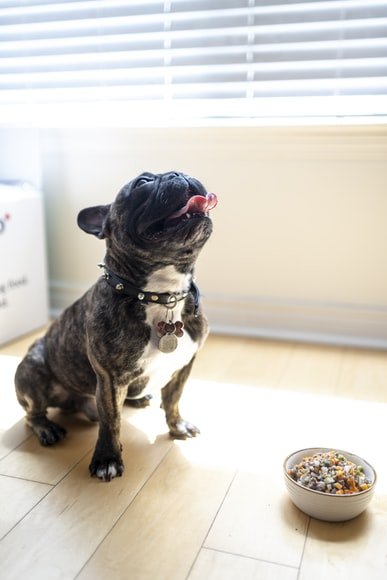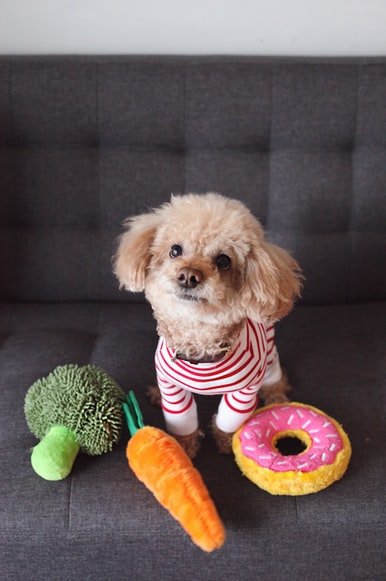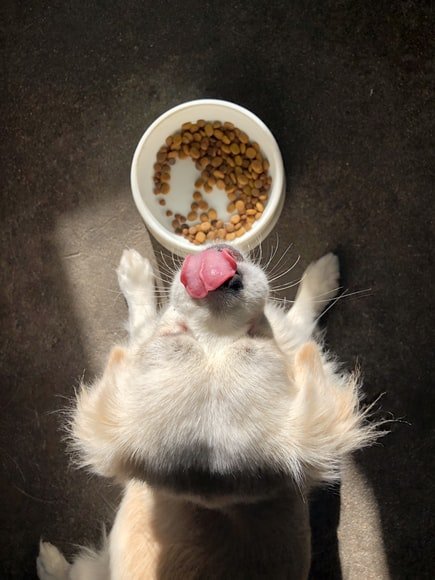We cover what can dogs eat and what you shouldn’t feed your pet.
Before we start, it’s important to note that below is just advice. Each dog is an individual and so will have individual preferences. Along with preferred tastes, you should consider your dog’s stage of life and health conditions when putting together a diet for your pooch.
We recommend that any diets should be consulted with vets or animal nutritionists first.
Is a dog an omnivore?
In short, yes. Dogs have the capability to eat and digest animal proteins from meat and carbohydrates. Their teeth ensure that they can easily chew bones, meats, seeds, and vegetables.
According to RSPCA insurance, it’s acceptable to feed your dog only a high-quality kibble. You can also mix the kibble in with things like fish, vegetables, rice, and cooked and raw meat (considerations apply to raw meat).
Some dog owners also recommend bulking out their diet with cooked pumpkin or raw grated carrot. This way your pet is able to get a varied diet.
How to make raw meat safe for your puppy
- Human-grade meat. Some meat made specifically for pets can contain preservatives.
- You must always practice excellent food hygiene.
- Always consult with a vet nutritionist to formulate a diet containing raw meat. It needs to be balanced according to their stage of life and medical conditions.
What can dogs eat as a treat?
- Bones
Dogs will enjoy chewing on a bone once or twice a week. It’s been found to help remove plaque too!
- Tinned fish
Tinned fish like sardines, tuna and salmon in spring water is a great alternative for a treat.
- Cheese
Although, many dogs are actually lactose intolerant. Given in moderation, your dog should enjoy the occasional piece of cheese.
Always remember, individual dogs will differ, so introduce a small amount of a new food at a time under professional guidance to monitor how your dog responds.
What can dogs not eat?
These foods should be avoided as they can cause severe negative effects.
- Chocolate
This is a known food that is poisonous to pooches. If your dog consumes any, please consult your vet immediately.
- Onion and garlic
Any food related to the onion family, whether raw or cooked, is toxic to canines.
- Citrus
Although not poisonous, citrus fruits can be tart and acidic to your pup.
- Avocados
All avocados contain a toxin called Persin which can give your furry friend a severely upset stomach.
- Salty foods
If your canine consumes salty foods, it can cause dehydration. In extreme cases it can even lead to sodium ion poisoning.
- Corn on the cob
Although not toxic to your pet, it can lead to blockages in the intestines which can be extremely serious.
- Grapes and raisins
These snacks can lead to liver damage and even kidney failure.
Food safe for dogs – what about dog food?
Any commercially manufactured pet food in the UK has to meet PFMA guidelines. This stands for the Pet Food Manufacturing Association.
This means that you can rest easy knowing that commercially manufactured pet food from the UK has been rigorously tested. Although, that isn’t to say that some are better than others.
A study carried out by Which found that there were differences in pet coat quality, enjoyment of food and even value for money. To see the fullWhich dog Food Brand is best full study results, click here.
If you’re ever concerned your pet has accidentally eaten something, please contact your vet as soon as possible for advice.
To see more guides on Puppy Diet or Puppy Health, click here.
An omnivore refers to a diet that's made up of produce from animals and plants.